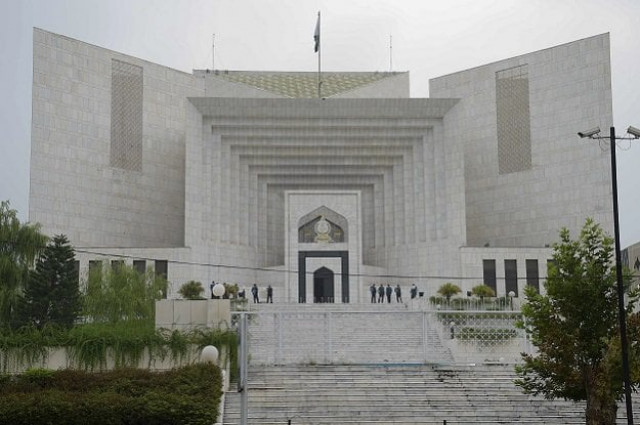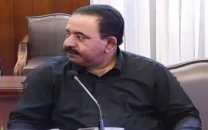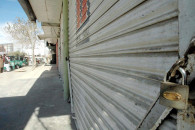About 40,336 cases pending in SC
No effective policy has been introduced to clear the backlog

Supreme Court of Pakistan. PHOTO: AFP
According to the fortnightly Supreme Court report, there has been a rapid increase in the institution of cases in the top court as 1,739 cases were filed in the month of July.
However, it has been noticed that the figure is increasing by the day as 39,525 cases were pending as on May 31 and the figure has now reached 40,336 on July 31.
On the contrary, the SC has decided 1,355 cases during the same period.
At present, there are 39 suo motu notices and 255 human rights cases pending while 2,173 jail petitions, 227 constitution petitions, 1,071 criminal appeals and 9,323 civil appeals are pending in the apex court.
Justice Siddiqui objects to jurisdiction of SJC
Chief Justice of Pakistan Mian Saqib Nisar is active to proceed with matters related to mal-administration as well as public interests.
He also created a special account in the SC to collect donations for the construction of dams. Similarly, an international conference is going to be held on the water issue next month. The chief justice also took steps to improve the health system.
However, the CJP is also admitting that he is unable to put the house (judiciary) in order. The issue of pendency in the SC is increasing day by day but no effective policy has been introduced to clear the backlog.
Legal experts are urging the CJP that the newly-elected government has taken charge. Therefore, he should show judicial restraint in the matters, which are related to the executive.
The CJP is set to retire in January 2019, therefore, he should focus on judicial reforms in his remaining tenure.
The CJP’s courageous approach may be helpful in improving the justice system like amendments to the Supreme Court Rules 1980, amendments to the Judicial Commission of Pakistan (JCP) rules 2010 to make the process, regarding the appointment of judges more transparent. Similarly, the chief justice may take steps for expeditious and inexpensive justice.
Renowned lawyer Faisal Siddiqui told The Express Tribune that paradoxically, continuing increase in the apex court pendency is a direct result of the increased effectiveness and rising legitimacy of the Supreme Court. “It is humanly impossible to control pendency,” he added.
Pendency of cases in top court hits 39,870
With regards to the solutions for clearing the backlog, Siddiqui said that there should be an increase in the number of SC judges to deal with this challenge. At present, the apex court is working at its full strength, i.e., 17 judges.
“Forget that you can deal with all pendency in all cases or reduce pendency generally. Concentrate on specific categories of cases, which are more important and urgent than others for example criminal appeals, post arrest bail applications etc. Through this way, you will greatly reduce pendency in critical category of cases,” he added.
Siddiqui believes that the SC full court meeting should take place that lays down the policy of how the SC should deal various categories of cases like, rent appeals etc.
The full court meeting held on July 7 had already observed that there was a rising trend in the institution of cases that showed the trust of people in the judiciary.
The top court discussed in detail different ways and means for effective functioning and underlined the need to categorise the cases so that dispensation of justice can further be improved.
However, a senior lawyer believes that the pendency of civil cases in the top court is the biggest challenge.
He also recommends that the time has come to implement a cost-and-fine system.
He added that the SC judges should also promote the alternative dispute resolution systems in the country.
The lawyer also said that the increase in the public interest litigation also encourages citizens to approach the apex court, even though litigants have not solid case to contest. He added that the government departments should review the policies and avoid filling frivolous cases.
During the Eighth Judicial Conference Justice Asif Saeed Khosa said, “There is a need to consider the ‘bar of finality, about the adjudication on facts,” adding “Only points of law should be brought before the apex court.”
On the other hand, senior lawyers appreciated the SC, especially Justice Khosa for working to end the backlog of criminal appeals.



















COMMENTS
Comments are moderated and generally will be posted if they are on-topic and not abusive.
For more information, please see our Comments FAQ